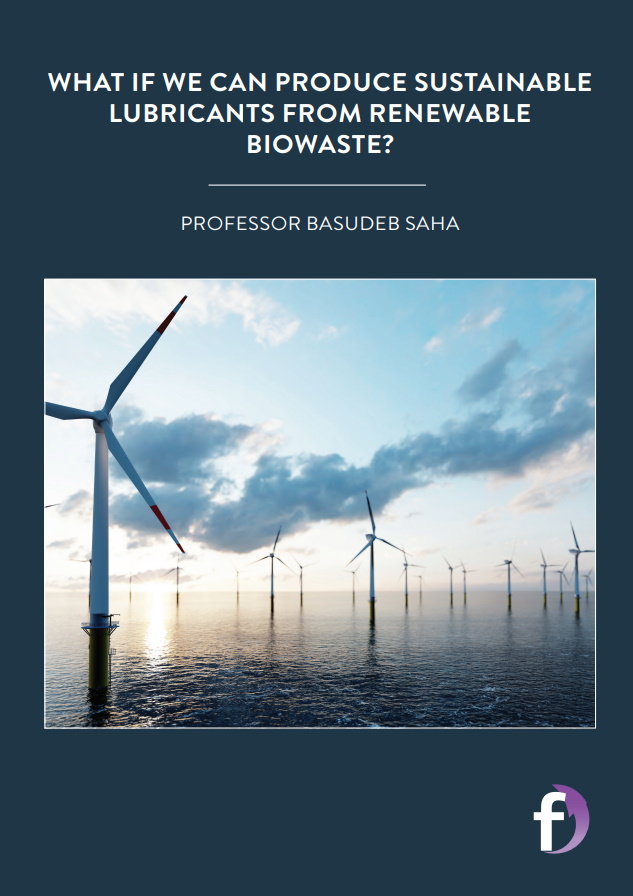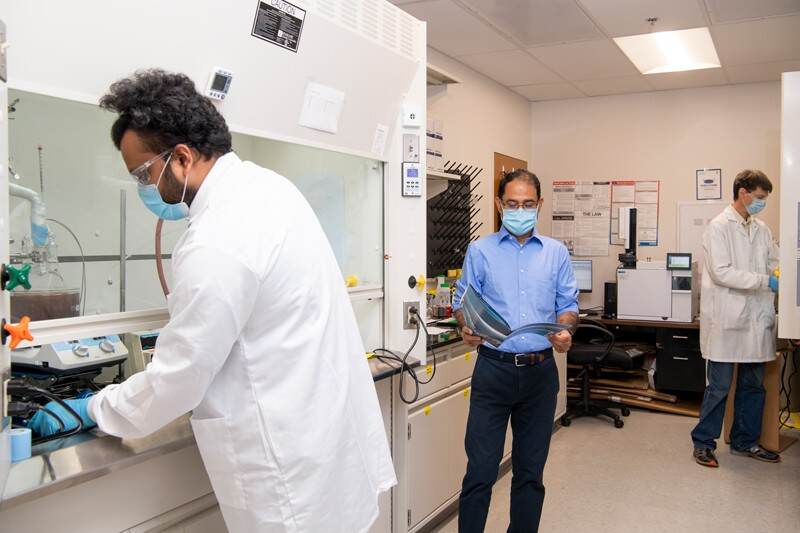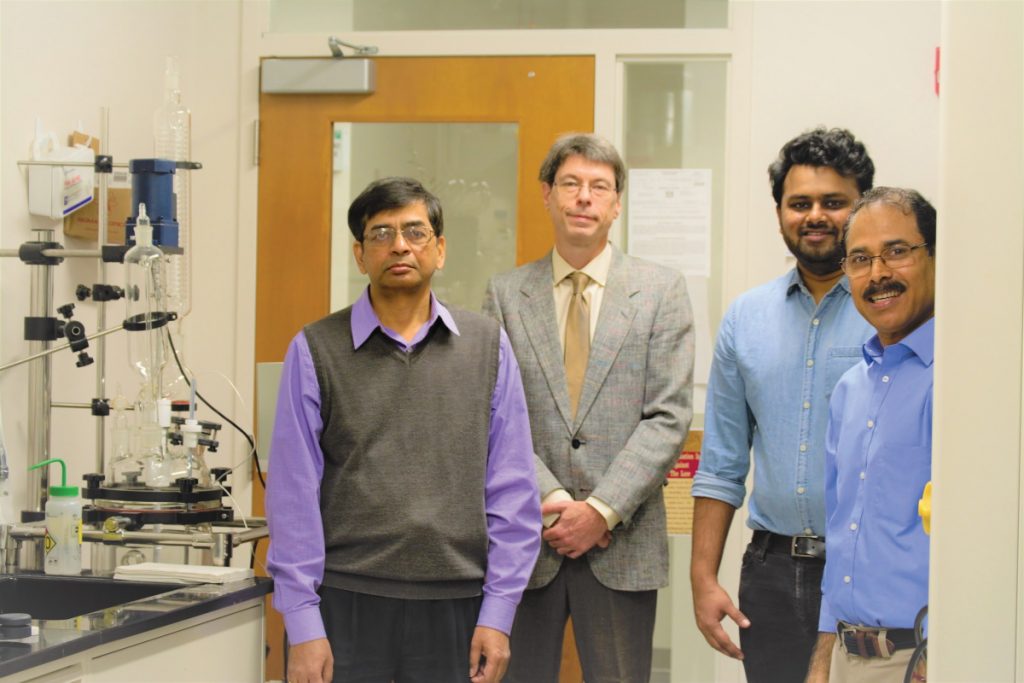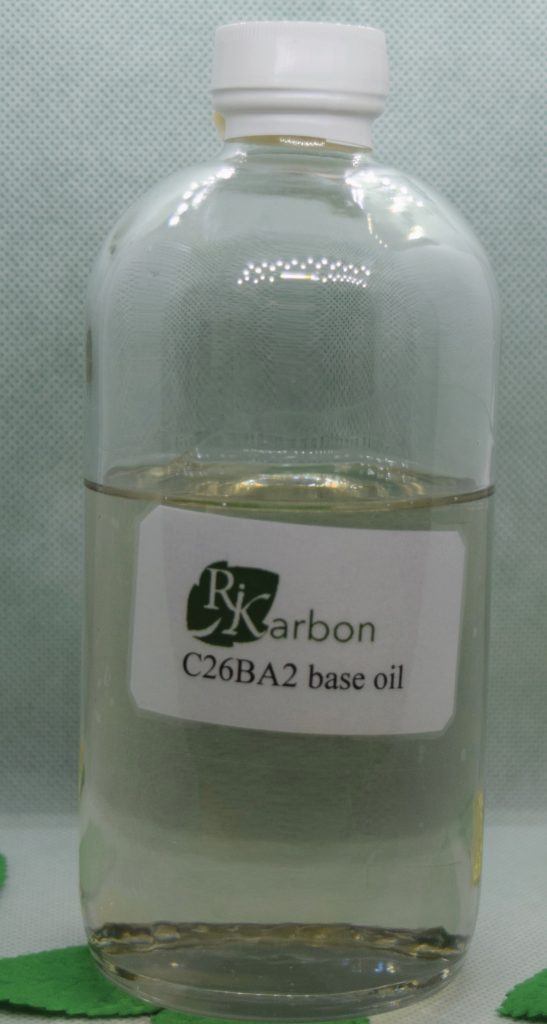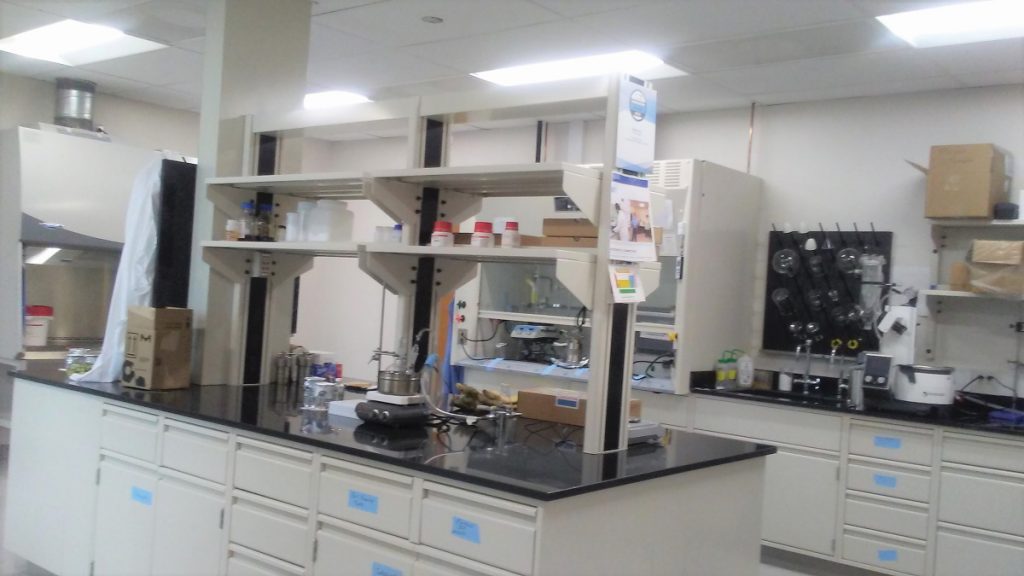What if we can produce sustainable lubricants from renewable biowaste?
Professor Basudeb Saha is Founder and President of RiKarbon, a company that produces cost-competitive and environmentally sustainable products. A large part of his team’s research is focused on the manufacture of lubricating oils, which are essential for reducing wear and tear in engines and machines
TALK LIKE A GREEN CHEMIST
LUBRICANT – any substance that reduces the amount of friction between two surfaces in contact with each other
BIOMASS – materials derived from trees, plants or animals that can be used as fuels or as raw materials for other products
BIOPRODUCTS – materials or chemicals that have been manufactured from renewable biomass
ENVIRONMENTAL SUSTAINABILITY – when actions cause little to no damage to the natural environment
ORGANIC MOLECULE – any chemical compound containing bonds between carbon and hydrogen atoms
BIOPOLYMERS – naturally occurring materials made up of long chains of organic molecules
FUNCTIONAL GROUP – groups of atoms attached to larger molecules, which alter their chemical properties
PETROLEUM – a dark liquid found deep beneath the Earth’s surface, which can be refined into many different types of carbon-emitting fuel
Without lubricating oils, many of the technologies we rely on in our everyday lives would literally grind to a halt. By allowing machine parts to smoothly glide over each other without generating too much friction, lubricants are crucial for running components like engines, turbines and compressors. When applied, they allow technologies as wide-ranging as airplanes, refrigerators and hydroelectric dams to operate reliably over decades-long lifespans. Yet, as companies worldwide begin to make serious efforts to reduce their carbon footprints, a lack of innovation in lubricant manufacturing techniques means that the whole industry risks falling behind in this crucial goal.
In 2018, Professor Basudeb Saha founded RiKarbon, a company based in Delaware, USA, which aims to provide ground-breaking solutions for industries that manufacture lubricating oils with high-carbon numbers. An important part of Basu’s work is based around the use of agricultural waste materials, including corn cobs, grasses and wood, to provide purely renewable and sustainable carbon for industrial lubricants.
By developing new ways to process the natural ingredients present in these renewable materials, RiKarbon has already made significant strides towards providing greener futures for many different industries.
WHY IS LUBRICANT MANUFACTURING SO UNSUSTAINABLE?
The friction-reducing properties of lubricating oils are made possible by organic molecules that have a structure based on long chains of carbon atoms. These molecules can be found in a wide variety of sources including methane and butane. Currently, the most popular lubricant is petroleum or crude oil, which is petroleum without the gas component. Petroleum is made up of decomposed organisms that have been buried deep underground for many millions of years. It is a complex mixture of hydrocarbons, carbon atoms that are joined together in chains and rings, and therefore a rich source of organic molecules. Petroleum is cheap and easy to refine to produce different products like gasoline, diesel and lubricants, which is why it is a popular choice for manufacturers of lubricating oils.
Unfortunately, when these lubricating oils reach the end of their operating lifetimes, the carbon they contain is released into the environment, causing pollution and contributing to climate change. To be more sustainable, lubricant manufacturing companies need to move away from their current practices. Renewable agricultural waste is one promising alternative.
Like petroleum, organic molecules can also be found in agricultural waste, often in the form of biopolymers named cellulose and lignin. Cellulose and lignin are found in plant cell walls and contain long chains of molecules, which can be broken down into a variety of organic molecule building blocks. Until recently, the chemical processes required to transform these polymers into useful products were too expensive. Not only that but once these biopolymers are broken down, their building blocks usually contain only short, simple chains of carbon atoms, making them an unsuitable alternative for petroleum-based lubricants with long carbon chains.
WHAT DOES RIKARBON DO DIFFERENTLY?
Basu and his team at RiKarbon have developed innovative chemical processes that can convert biopolymers into far larger and more complex molecules. So far, the scientists have been able to synthesise molecules with a wide variety of carbon chain lengths, and even chains which branch in certain places. They can also attach particular functional groups to the molecules, altering their chemical properties. In turn, the friction-reducing properties of RiKarbon’s oils can be precisely tailored to suit the specific needs of lubricant manufacturers, who require different types of lubricant in their formulating processes. Crucially, the structures of these molecules are similar to those found in lubricants made from petroleum, meaning the manufacturers who use them do not need to alter their usual practices. Reaching this point has been a key step in bringing RiKarbon’s lubricating oils into the real world.
CAN RIKARBON’S PRODUCTS COMPETE WITH PETROLEUM?
In the past, lubricant manufacturers could only bring about the properties they wanted in their products by mixing in large amounts of petroleum-based additives. This was a costly and time-consuming process. Through Basu’s approach, the need for additives can potentially be done away with entirely, since the properties of their sustainably-produced oils can be finely tuned during the manufacturing process itself.
This comes with a whole host of advantages over petroleum-based products. In car engines and hydroelectric turbines, for example, temperatures can become extremely high, which risks breaking down the chemical structures of lubricants if the molecules are unstable. RiKarbon is producing highly stable molecules that offer long, operational lifetimes for lubricating oils, even when they are regularly exposed to extreme temperatures.
Reference
https://doi.org/10.33424/FUTURUM121
LUBRICANT – any substance that reduces the amount of friction between two surfaces in contact with each other
BIOMASS – materials derived from trees, plants or animals that can be used as fuels or as raw materials for other products
BIOPRODUCTS – materials or chemicals that have been manufactured from renewable biomass
ENVIRONMENTAL SUSTAINABILITY – when actions cause little to no damage to the natural environment
ORGANIC MOLECULE – any chemical compound containing bonds between carbon and hydrogen atoms
BIOPOLYMERS – naturally occurring materials made up of long chains of organic molecules
FUNCTIONAL GROUP – groups of atoms attached to larger molecules, which alter their chemical properties
PETROLEUM – a dark liquid found deep beneath the Earth’s surface, which can be refined into many different types of carbon-emitting fuel
Without lubricating oils, many of the technologies we rely on in our everyday lives would literally grind to a halt. By allowing machine parts to smoothly glide over each other without generating too much friction, lubricants are crucial for running components like engines, turbines and compressors. When applied, they allow technologies as wide-ranging as airplanes, refrigerators and hydroelectric dams to operate reliably over decades-long lifespans. Yet, as companies worldwide begin to make serious efforts to reduce their carbon footprints, a lack of innovation in lubricant manufacturing techniques means that the whole industry risks falling behind in this crucial goal.
In 2018, Professor Basudeb Saha founded RiKarbon, a company based in Delaware, USA, which aims to provide ground-breaking solutions for industries that manufacture lubricating oils with high-carbon numbers. An important part of Basu’s work is based around the use of agricultural waste materials, including corn cobs, grasses and wood, to provide purely renewable and sustainable carbon for industrial lubricants.
By developing new ways to process the natural ingredients present in these renewable materials, RiKarbon has already made significant strides towards providing greener futures for many different industries.
WHY IS LUBRICANT MANUFACTURING SO UNSUSTAINABLE?
The friction-reducing properties of lubricating oils are made possible by organic molecules that have a structure based on long chains of carbon atoms. These molecules can be found in a wide variety of sources including methane and butane. Currently, the most popular lubricant is petroleum or crude oil, which is petroleum without the gas component. Petroleum is made up of decomposed organisms that have been buried deep underground for many millions of years. It is a complex mixture of hydrocarbons, carbon atoms that are joined together in chains and rings, and therefore a rich source of organic molecules. Petroleum is cheap and easy to refine to produce different products like gasoline, diesel and lubricants, which is why it is a popular choice for manufacturers of lubricating oils.
Unfortunately, when these lubricating oils reach the end of their operating lifetimes, the carbon they contain is released into the environment, causing pollution and contributing to climate change. To be more sustainable, lubricant manufacturing companies need to move away from their current practices. Renewable agricultural waste is one promising alternative.
Like petroleum, organic molecules can also be found in agricultural waste, often in the form of biopolymers named cellulose and lignin. Cellulose and lignin are found in plant cell walls and contain long chains of molecules, which can be broken down into a variety of organic molecule building blocks. Until recently, the chemical processes required to transform these polymers into useful products were too expensive. Not only that but once these biopolymers are broken down, their building blocks usually contain only short, simple chains of carbon atoms, making them an unsuitable alternative for petroleum-based lubricants with long carbon chains.
WHAT DOES RIKARBON DO DIFFERENTLY?
Basu and his team at RiKarbon have developed innovative chemical processes that can convert biopolymers into far larger and more complex molecules. So far, the scientists have been able to synthesise molecules with a wide variety of carbon chain lengths, and even chains which branch in certain places. They can also attach particular functional groups to the molecules, altering their chemical properties. In turn, the friction-reducing properties of RiKarbon’s oils can be precisely tailored to suit the specific needs of lubricant manufacturers, who require different types of lubricant in their formulating processes. Crucially, the structures of these molecules are similar to those found in lubricants made from petroleum, meaning the manufacturers who use them do not need to alter their usual practices. Reaching this point has been a key step in bringing RiKarbon’s lubricating oils into the real world.
CAN RIKARBON’S PRODUCTS COMPETE WITH PETROLEUM?
In the past, lubricant manufacturers could only bring about the properties they wanted in their products by mixing in large amounts of petroleum-based additives. This was a costly and time-consuming process. Through Basu’s approach, the need for additives can potentially be done away with entirely, since the properties of their sustainably-produced oils can be finely tuned during the manufacturing process itself.
This comes with a whole host of advantages over petroleum-based products. In car engines and hydroelectric turbines, for example, temperatures can become extremely high, which risks breaking down the chemical structures of lubricants if the molecules are unstable. RiKarbon is producing highly stable molecules that offer long, operational lifetimes for lubricating oils, even when they are regularly exposed to extreme temperatures.
Similarly, the branching structures of RiKarbon’s lubricating oils mean that they do not freeze easily and remain in their liquid form even in extreme cold conditions. This is critical for aeroplanes flying through the cold stratosphere, and machines that operate in harsh winter conditions.
WHAT DOES THE FUTURE HOLD FOR RIKARBON?
By inventing new ways to produce sustainable lubricants with desirable, highly tuneable properties, i.e. they can be adapted to manufacturers’ specific needs, Basu and his team are offering products with significant advantages over petroleum-based alternatives, even in a highly competitive market. Excitingly, the researchers are collaborating with several large companies to expand the reach of their products on the global marketplace. As part of these collaborations, they are aiming to help manufacturers reach new sustainability goals and, ultimately, achieve net-zero carbon emissions in the coming decades.
Through these efforts, Basu and his team hope to expand the scope of their manufacturing processes even further, extending into cosmetic moisturisers and advancing ways to recycle plastic. Ultimately, their innovations could pave the way for a more sustainable future, where industrial manufacturing does not come at the cost of damaging our planet’s atmosphere and ecosystems.
 PROF BASUDEB SAHA
PROF BASUDEB SAHA
Founder, RiKarbon, Newark, Delaware, USA
FIELD OF RESEARCH: Green Chemistry, Sustainable Products, Catalysis
RESEARCH PROJECT: Basu is leading his company in developing new ways to manufacture lubricating oils from biomass waste. The resultant innovations are helping large manufacturing companies meet their sustainability targets.
FUNDER: US Department of Energy (Grant number: DE-SC0018789)
ABOUT GREEN CHEMISTRY
Green chemistry is a branch of chemistry that aims to develop products that are safer for human health and less damaging to the environment. The reactions and processes studied by green chemists are not any different from those used in other fields of chemistry, except that these researchers always aim towards sustainability as an end goal.
WHY IS GREEN CHEMISTRY SO IMPORTANT?
No one knows how many chemicals are in use today, but the Environmental Protection Agency in the US has more than 85,000 chemicals listed on its inventory of substances that fall under the Toxic Substances Control Act. Green chemistry is fast becoming crucial to the global fight against environmental degradation. Across the world, many large companies and academic institutions are adapting their policies to reduce their environmental impact, as well as reach net zero carbon emissions. Because of this, Basu says that there are more opportunities than ever for aspiring green chemists, and the number of jobs in this area is growing by the day.
WHERE COULD GREEN CHEMISTRY RESEARCH LEAD IN THE FUTURE?
Besides lubricants, there are still many products that rely on carbon-intensive manufacturing processes, including steel and concrete. Discoveries made by researchers like Basu, as well as a new generation of green chemists, will provide ingenious solutions to these problems. As they combine innovations with stronger relationships with manufacturers and the busines sector, green chemists could become key players in the world’s efforts to solve environmental challenges, including climate change.
HOW TO BECOME A GREEN CHEMIST
• RiKarbon welcomes high school students to their labs on request. If you are not based in Delaware, reach out to similar green chemistry companies in your area. Showing an interest in green chemistry in this way will enable you to gain an insight into the work involved and extend your network of people working in this field. You may even end up with an apprenticeship or mentor!
• The American Chemical Society has a lot of information on how to start a career in chemistry and branch out to become a green chemist: https://www.acs.org/content/acs/en/education/students.html
• Many universities worldwide are now offering degrees in green chemistry, including the universities of Massachusetts Boston, Michigan and Oregon in the US; and York, Leicester and Imperial College London in the UK.
• The average salary for a green chemist with an undergraduate degree in the US is between $53,324 and $67,840.
HOW DID BASU BECOME A GREEN CHEMIST?
TELL US ABOUT YOUR BACKGROUND.
I was brought up in a business family in India. I completed my PhD in chemistry from a reputed institute in India – the Indian Association of Cultivation of Science. This was where Professor C.V. Raman discovered the Raman spectrometer, for which he received a Nobel prize. Afterwards, I worked with chemical engineers and chemists at Iowa State University and Dow Chemicals in the US, and taught chemistry courses to BSc, MSc and PhD students at the Universities of Delhi and Delaware. These positions gave me opportunities to learn green chemistry methodologies, practise chemistry with a green-mindset and produce products where safety and society come first.
OUTSIDE OF RIKARBON, WHAT ARE YOUR RESEARCH INTERESTS?
Since 2009, after moving back to academic research, my work has primarily focused on developing new technologies, including taking waste products, such as non-food biomass and carbon monoxide, and converting them into a variety of renewable products and fuels. These products help meet growing consumer demands, promote the environment and reduce carbon footprints. I have invented 21 granted and submitted patents, overall, and authored over 115 peer-reviewed journal articles. I also edited the book Sustainable Catalytic Processes, which was published by Elsevier.
Alongside this work, I founded and cofounded two start-ups to commercialise sustainable products for cosmetics, lubricants, food flavourings and bio-plastics.
WHAT LED TO THE EARLY SUCCESS OF RIKARBON?
In 2014, I co-founded my first venture to commercialise fragrance and food flavouring ingredients. This provided me with my first experience in entrepreneurship and helped to flush out the key business components and challenges for RiKarbon’s current technology. I founded RiKarbon in 2018 to transform my other lab-scale research invention into commercial products. From the start, the RiKarbon team was fortunate in three particular areas. Firstly, we were able to collaborate with the Horn Entrepreneurship Centre at the University of Delaware and Delaware Small Business Development Centre.
Secondly, we secured funds from Blue Hen, after developing a prototype of our methods. Finally, we received support from the National Science Foundation for the I-Corps cohort programme. The I-corps programme allowed us to carry out over 160 in-person interviews and to attend trade shows and workshops to gain knowledge about current products, gaps and market needs. This market research enabled us to lay out a realistic plan for the business and to create new relationships with customers, partners, advisors and contract research companies.
Finally, I secured funding resources from the US Government SBIR/STTR programme, making RiKarbon a reality. This allowed us to hire employees, develop the company infrastructure and the technology required for the process, and send products to potential customers for testing.
WHAT ARE THE NEXT STEPS FOR YOUR BUSINESS?
I see tremendous enthusiasm for our products among our potential customers, partners and investors as they seek to achieve their sustainability goals. In turn, this gives me enormous enthusiasm to continue transforming RiKarbon into a large company. The next steps include identifying partners to manufacture products on commercial scales, selling our products to lubricant and cosmetics manufacturing companies, hiring more employees and developing an even more diverse range of products!
BASU’S TOP TIPS
01 If you care about the environment and are passionate about environmental sustainability, you will enjoy a career in green chemistry.
02 All of us have certain in-born qualities. Nurture these qualities and use these strengths, not weaknesses, to promote your passion.
03 If you are planning to start your own environmentally-friendly venture, start by identifying one or more products that you suspect or know are problematic for the environment. Interview your friends, family and peers to find out whether they have the same environmental concerns. Expand your research: How many people share these same concerns? And do they belong to a particular socio-economic or age group? This will give you an idea how big or small the problem is. Now, look for solutions and find out whether people would be willing to pay for these solutions. Identifying a problem, finding out how big the problem is and working out who would buy your solution/product are key steps for launching a business. Most people fail in business because they have not considered all of these factors. It needs time and patience, but passion will drive you and keep you on track.
Do you have a question for Basudeb?
Write it in the comments box below and Basudeb will get back to you. (Remember, researchers are very busy people, so you may have to wait a few days.)

